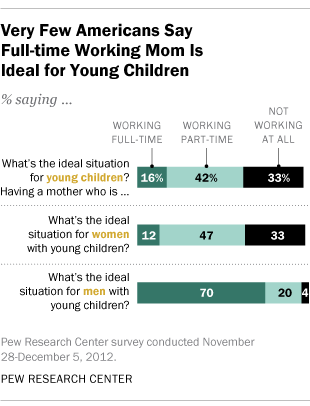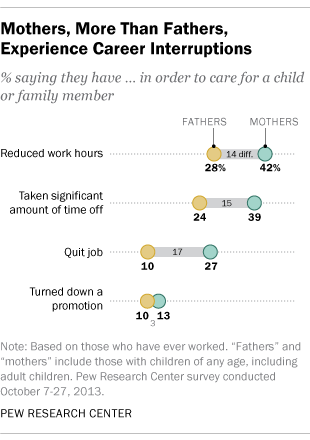Today's Younger Workers Tend to Give Jobs a Higher Priority Than Their Family.
For working parents in the U.Due south., the challenge of juggling careers and family life continues to be a forepart-burner issue – one that is beingness recognized by a growing number of employers who have adopted family unit-friendly policies such every bit paid exit. But while few Americans want to run across a return to traditional roles of women at home and men in the workplace, one reality persists: Women most often are the ones who arrange their schedules and make compromises when the needs of children and other family members collide with work, Pew Research Heart data bear witness.
In a 2013 survey, we constitute that mothers were much more likely than fathers to report experiencing meaning career interruptions in order to attend to their families' needs. Part of this is due to the fact that gender roles are lagging behind labor force trends. While women represent nearly one-half of the U.Due south. workforce, they however devote more time than men on boilerplate to housework and child intendance and fewer hours to paid work, although the gap has narrowed significantly over time. Amid working parents of children younger than 18, mothers in 2013 spent an average of 14.2 hours per week on housework, compared with fathers' 8.six hours. And mothers spent 10.7 hours per week actively engaged in child care, compared with fathers' 7.ii hours.

Another factor is the fashion that society views the bail betwixt mothers and their children. In a 2012 Pew Research survey, the vast majority of Americans (79%) rejected the notion that women should return totheir traditional role in society. Withal when they were asked what is best for young children, very few adults (xvi%) said that having a mother who works total time is the "ideal situation." Some 42% said that having a mother who works office time is ideal and 33% said what's best for young children is to have a mother who doesn't work at all. Even among full-fourth dimension working moms, only about one-in-5 (22%) said that having a total-time working mother is platonic for young children.
When asked what'southward best for women themselves, the public expressed a like sentiment. Simply 12% of adults said the platonic situation for women with young children is to work total time. Nearly half (47%) said working part time is ideal for these women, while 33% said not working at all would be the best situation.
The public applies a much different standard to fathers. When we asked almost the platonic situation for men with immature children, fully vii-in-ten adults said working full time would be ideal for these fathers. Ane-in-v adults said part-fourth dimension work would exist platonic and simply iv% said it would be best for these dads not to work at all.
In reality, the "ideal" situation is non always the near practical, nor is it always attainable. In fact, according to U.S. government information, 64% of mothers with children younger than 6 are in the labor force, and amidst working mothers, 72% work total time.
 One result is that while 42% of mothers with some piece of work experience reported in 2013 that they had reduced their work hours in gild to care for a child or other family fellow member at some indicate in their career, simply 28% of fathers said the same. Similarly, 39% of mothers said they had taken a significant corporeality of fourth dimension off from work in gild to care for a family unit fellow member (compared with 24% of men). And mothers were about three times as likely as men to study that at some indicate they quit a job so that they could care for a family member (27% of women vs. 10% of men).
One result is that while 42% of mothers with some piece of work experience reported in 2013 that they had reduced their work hours in gild to care for a child or other family fellow member at some indicate in their career, simply 28% of fathers said the same. Similarly, 39% of mothers said they had taken a significant corporeality of fourth dimension off from work in gild to care for a family unit fellow member (compared with 24% of men). And mothers were about three times as likely as men to study that at some indicate they quit a job so that they could care for a family member (27% of women vs. 10% of men).
It'due south important to annotation that when we asked people whether they regretted taking these steps, the resounding answer was "No." However, it's besides important to notation that women who had experienced these interruptions were much more likely than men to say that this had a negative impact on their career. For example, women who took time off at some point in their work life to care for a child or other family unit fellow member were twice every bit likely as men who did the same to say that this injure their career overall (35% vs. 17%). Similarly, among those who took a significant amount of time off from piece of work to look later a family unit fellow member, 32% of women compared with xviii% of men said doing this hurt them professionally.
According to many economists, family-related career interruptions tin can undermine women's economic prospects in a variety of ways, by contributing to the gender wage gap and by narrowing the pipeline that feeds acme-level jobs. Of course, for lots of women these interruptions may serve as the goad to a more than balanced life which may in plow outweigh whatever lost fiscal benefits.
In her new book "Unfinished Concern: Women, Men, Piece of work, Family," Anne-Marie Slaughter raises many of these problems, and in a contempo New York Times article, Slaughter said that what is needed in order to alter private workplaces is a "culture modify: central shifts in the way we retrieve, talk and confer prestige." Our information propose that a generational shift, if not a civilization change, may be coming. When nosotros asked immature adults (ages 18 to 32) who don't yet have children whether they anticipate that becoming a parent will make information technology harder or easier for them to advance in their job or career, immature men were merely as likely as immature women to say that children volition likely irksome downwardly their career advancement (roughly sixty% in each group). This suggests that Millennial men may be entering their careers with a different set of expectations about what balancing family life and work will entail.
At the same time, though, amongst immature adults with children, women are much more likely than men to say existence a working parent makes information technology harder for them to get ahead at work (58% of Millennial moms say this, versus nineteen% of Millennial dads).
These problems enhance anew debates over government and workplace policies designed to support parents and families. While the national conversation continues, working parents across America will continue to juggle their many responsibilities – making time for caregiving along the way.

Kim Parker is director of social trends inquiry at Pew Enquiry Centre.
rothermelhicely1965.blogspot.com
Source: https://www.pewresearch.org/fact-tank/2015/10/01/women-more-than-men-adjust-their-careers-for-family-life/
0 Response to "Today's Younger Workers Tend to Give Jobs a Higher Priority Than Their Family."
Postar um comentário